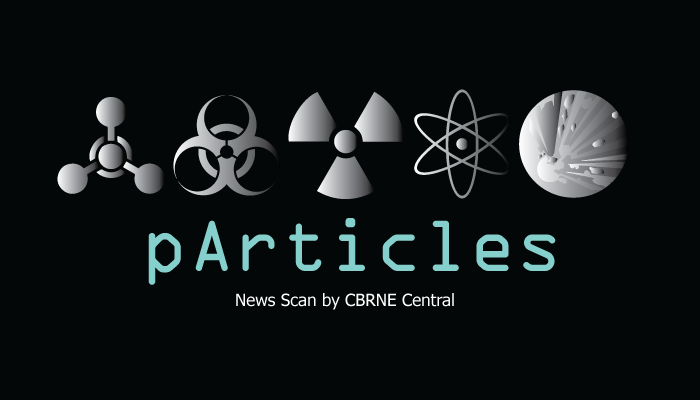Topics in this issue include chemical weapons in Aleppo, UN nuclear testing resolution, dirty bomb material acquisition, and the Joint Improvised Threat Defeat Agency.
In This Article
A Secret Group Bought the Ingredients for a Dirty Bomb — Here in the U.S.
The clandestine group’s goal was clear: Obtain the building blocks of a radioactive “dirty bomb” — capable of poisoning a major city for a year or more — by openly purchasing the raw ingredients from authorized sellers inside the United States. Washington Post >>
Obama Will Bypass Congress, Seek U.N. Resolution On Nuclear Testing
President Obama has decided to seek a new United Nations Security Council resolution that would call for an end to nuclear testing, a move that leading lawmakers are calling an end run around Congress. The administration did not consult Congress before making the decision, and leading Republicans, including those who opposed Obama’s nuclear deal with Iran, are irate that the White House plans another major national security move without their advice or consent. Washington Post >>
Why the United States Did Not Demonstrate the Bomb’s Power, Ahead of Hiroshima
Arthur H. Compton was one of the many past and future Nobel laureates who worked in the secret US nuclear weapons project during World War II. He directed the Metallurgical Laboratory (Met Lab) at the University of Chicago, where refugee Italian Nobelist Enrico Fermi supervised the construction of the first reactor, future Nobelist Eugene Wigner, from Hungary, led the design of the plutonium-production reactors subsequently built at Hanford, Wash., and future Nobelist Glenn Seaborg developed the first chemical process for extracting plutonium from irradiated uranium. Bulletin of the Atomic Scientists >>
Chemicals Manufacturer Cited by OSHA Following Explosion
A Massachusetts chemicals manufacturer has been cited by federal labor officials following a January explosion that injured four workers. The U.S. Department of Labor says an investigation by the Occupational Safety and Health Administration determined that Rohm-Haas Electronics Material LLC failed to adequately design, inspect, maintain and operate the chemical process that led to the fire and explosion at the company’s North Andover plant. Chem.info >>
Russia Claims Syrian Rebels Used Chemical Weapons in Aleppo
The Russian military informed the United States that rebels in the Syrian city of Aleppo launched an attack using toxic substances at 19:05 on Aug. 2, Interfax news agency reported on Wednesday, citing a Russian general. Business Insider >>
Toxic Gas Containers Air-Dropped in Syrian Town
A Syrian rescue service operating in rebel-held territory said on Tuesday a helicopter dropped containers of toxic gas overnight on a town close to where a Russian military helicopter had been shot down hours earlier. The opposition Syrian National Coalition (SNC) accused President Bashar al-Assad of being behind the attack. Assad has denied previous accusations of using chemical weapons. A spokesman for the Syria Civil Defence said 33 people, mostly women and children, were affected by the gas, which they suspect was chlorine, in Saraqeb, in rebel-held Idlib province. The Wire >>
Nervous About Nukes Again? Here’s What You Need to Know About the Button
On Wednesday, MSNBC’s Joe Scarborough claimed that Trump asked a foreign-policy adviser three times why, if we have nuclear weapons, can’t we use them? (A Trump spokeswoman denied that this happened.) One reason: The detonation of 100 nuclear warheads — there are about 15,000 on the planet right now — could kill 2 billion people, according to International Physicians for the Prevention of Nuclear War. Washington Post >>
JIDA Seeks Fresh Approach to Defeat ISIL Bombs
Improvised explosive devices continue to be one of the greatest threats facing troops in Iraq and Afghanistan, the director of the Joint Improvised Threat Defeat Agency said Aug. 2. The IED “continues to be the tactical operational strategic weapon of choice” for terrorist groups including the Islamic State and al-Qaida, said Army Lt. Gen. Michael Shields. The Islamic State’s ability to manufacture and deploy IEDs on an industrial scale has proved to be a challenge for JIDA and its partners in Central Command’s Combined Joint Task Force. National Defense >>
Debate Over Trump’s Fitness Raises Issue of Checks on Nuclear Power
“There’s no veto once the president has ordered a strike,” said Franklin C. Miller, a nuclear specialist who held White House and Defense Department posts for 31 years before leaving government service in 2005. “The president and only the president has the authority to order the use of nuclear weapons.” NY Times >>


